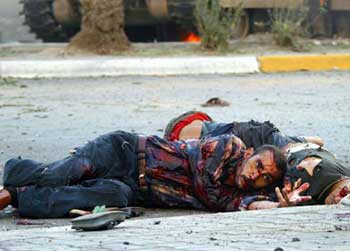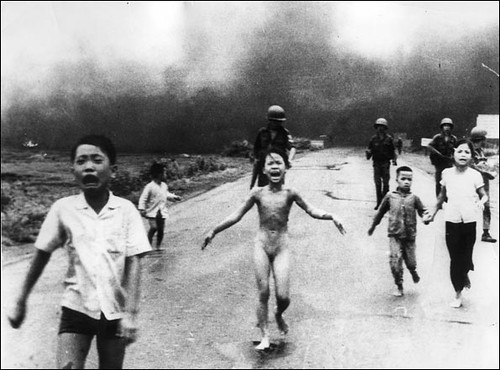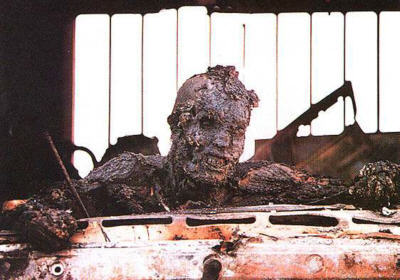
A very difficult subject for me to write about this week as I believe that we should be, in our modern world of usually educated and informed people, able to avoid wars and that wars, for whatever reasons they are happening, are usually bringing nothing else than destroyed and lost lives.

Wars have often been misrepresented to citizen of a country. We always want to believe that our country, the one that is at war with another, has the right to do it in order to save us and will often believe whatever is reported to us. Many German people felt that the 2nd world war was the fault of Jews. Journalists were working for Hitler, for Germany, to misrepresent the horrors the Jews were living, the horrors of the war. But since the Gulf war - this war were the US were going to save the world against the horrible people they were saying are the Arab people - the way war is reported has changed. As written by Jordan Crandall, during the Gulf war they were around 600 journalists assigned to give us all ‘front row seats to the war”.

By reading this fact, my question is why did we always see the same images, the same reporting? With so many journalists someone would expect a variety of views regarding this war, a variety of images. As we can read in http://www.worldpublicopinion.org/pipa/articles/international_security_bt/102.php?nid=&id=&pnt=102&lb=brusc , a reading I would greatly recommend to people interested in the impact of misrepresentation of wars, we can see that many people do not really know the real reasons behind a war and have a wrong impression of this war with the program and newspaper they are reading, listening and viewing everyday. The world has mainly seen what is convenient for the American government to show: they are the good one and the others are the bad one. The same can be said today with the second Iraq war. The difference being that many viewers are aware of the biases of the war reporters or journalists with the knowledge of what happened during the Vietnam and the gulf wars but do not, usually, mind – as they often don’t ask themselves if this is a true presentation of this war - that they have a unique view of the war, the one that the respective country government allows the journalist to project their readers or viewers.
I am still bothered to see that a wide number of people do not care if the War reportages do no really represent 100% what is happening in a special war. Today we, as viewers, are in search of more sensational images that will give us the impression we are viewing the war in direct, like a reality show. In fact, I would go further to say that the war does not interest many if it is not presented as a reality TV show.
Then we can wonder why do we rarely see the disturbing images I have found on the Internet. Is it because it would make the US citizens or other country citizens think a bit more about the reasons of a specific war, the fatalities and horrors that are going on in the other country, the cost of this war.


This is unfortunately the world we are living in, a world were we, as viewers and readers are asking more reality programs, more sensational stories and images that are given to us by journalists. It is a pity that we cannot find more journalists that are ready to work as independent, without the pressure of bigger company or of the government. It is sad to see that we are now in a world where the hyper reality is more important than the reality. It is natural to want to put all faults on the other country we are against to, the one we are at war with, but it is not normal not to try to understand what sort of war conditions are living the citizen of the other country.
We can also ask us the question why do we often hear about the war on Irak but not about so many others going on in the world, like the one in Darfur (http://www.commondreams.org/views05/0819-26.htm). I like what is written on this website to make the readers better understand the way war are reported and when they are good enough to be reported.
• Invisible because it is happening in Africa. Invisible because our mainstream media are subsidized by the petroleum industry. Think of all the car ads you see on television, in newspapers and magazines. Think of the narcissism implicit in our automobile culture, our suburban sprawl, our obsessive focus on the rich and famous, the giddy assumption that all this can continue indefinitely when we know it can't -- and you see why Darfur slips into darkness.
• “Why is it, I wonder, that when a genocide takes place in Africa, our attention is always riveted on some black American miscreant superstar? During the genocide in Rwanda ten years ago, when 800,000 Tutsis were slaughtered in 100 days, it was the trial of O.J. Simpson that had our attention.”
It Does look to me that hyperreality and entertainment are only about what many wants to hear and see to the detriment of so many important subject to learn and hear about.

We had the Vietnam war, then the gulf war, now Iraq (http://www.historyguy.com/War_list.html#warlist13a ) and one would believe that we would have learnt with these experiences to be more careful with our thoughts on what is represented to us by journalists and governments. But it looks like the human being will never learn from his mistakes and continue to do them for at least many more years to come. So my last question I ask myself is: when eventually the actual war going on between the US and the middle East (this war that the US wants so much to win to whatever cost) will be finished, if it ever does, what will the US fight or try to empower? Australia, China, Europe?!? And will we, as citizen of a country, believe whatever is presented to us without questioning if this is the truth, a true representation of an event, or just what someone want us to believe it is.








No comments:
Post a Comment